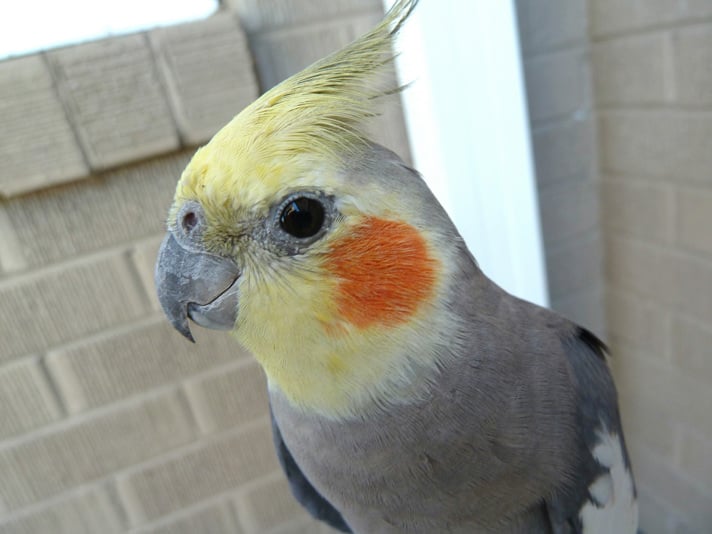5 Things You Must Know About Cockatiel Care

Photo by PROsad_poikilotherm/Flickr
For more than a decade, cockatiels continue to hold the title as America’s favorite pet bird. With their cheerful disposition and gentle nature, cockatiels make excellent companions for children, families, the elderly and chronically ill. Before acquiring a cockatiel, however, here are five care tips you should be aware of in order to be a saavy cockatiel owner.
1. Cockatiels Are Creatures Of Habit
Cockatiels thrive on schedules and become accustomed to regular feed and clean-up times. Professional aviculturists understand the value of keeping birds on a regular schedule to help develop trust and a growing bond, where birds learn they can count on you daily. Regular bedtimes — even on weekends — allow your cockatiel to get the rest she needs to remain happy and healthy. Sufficient exercise — supervised outside the bird cage — proper rest and feeding healthy bird food act as preventatives to illness. Any changes to a cockatiel’s cage or location should be done gradually. Changes in cages or locations can be upsetting for cockatiels, so keep favorite toys, food cups, other birds or people your bird is attached to around to provide some comfort and continuity.
2. Cockatiels Are A Highly Sensitive Species
Unless a cockatiel is defending her territory or nesting site, aggressive behavior in cockatiels is a fear response. Whether handfed, or parent reared, approach your cockatiel slowly and calmly, with a gentle, soothing voice to gain trust and establish a bond. Gaining trust takes time and your approach can either help or hinder the process. Fearful cockatiels will “hiss” like a snake, spread their wings, and raise their crests to the alert status to give the impression they are much larger and more dangerous than they actually are. Cockatiels are the “alert birds” of mixed flocks, the first to signal unknown danger through their high pitched calls. They are also most susceptible to night frights and need a night light to prevent crashing into walls in the dark. Respect your cockatiels feelings; back off, or end a training session on a positive note with soothing, reassuring tones and reward treats. Once your cockatiel learns you are not a threat, it will eventually seek out your companionship.
3. Cockatiels Produce Dust From Powder Down
Cockatiels and cockatoos are among the few parrots that produce a powder down, or have pulviplumes (pulvis for dust or powder, and plume meaning feather). While a cockatiel preens her feathers, she spreads this powder throughout her plumage. If you keep several cockatiels, you might notice a continual light coating of dust in your house, or that you are dusting more than usual. Powder down is a known antigen in humans and can cause an allergic reaction to people who are sensitive to it. It’s highly recommended to invest in a good quality air cleaner to keep the dust to a minimum. Bathing your cockatiel(s) regularly helps to control the dust produced. Avoid possible drafts from open windows, air conditioners, or heating elements that can lead to respiratory illness.
4. Hormonal Changes Affect Both Male and Female Cockatiels
It’s usually not a matter of if a female cockatiel will lay eggs, but when. Many female cockatiels lay one or more eggs at about a year of age, or once physiologically mature. Never, ever, remove an egg once laid, because removing an egg will trigger her to lay another egg to make up for the loss. Allow her to incubate and abandon her eggs of her own accord, when she is ready. Rising hormones can cause your cockatiel to show transferred aggression by biting another bird or object nearby (for example, your fingers!), so don’t take it personally. Males will often become aggressive to their owners, nipping and biting, once they are ready to breed. These hormonal phases are temporary. Once hormone levels return to normal, your cockatiel will return to its usual loving, cheerful behavior.
5. Cockatiels Can Be Trained At Any Age
Although it is much easier to tame a baby cockatiel, or purchase a handfed baby that is already tame, any cockatiel no matter the age can be tamed. The secret is patience, gentleness and perseverance! I have heard many stories of older cockatiels becoming tame when finding a caring, new owner later in life. It may take time for an older bird to gain your trust, but with perseverance, patience, and gentle coaxing, older birds can be tamed. The secret? Never, ever, give up on a bird. If you still find you have difficulty, consult a professional bird behaviorist to learn how to relate to an older bird.



